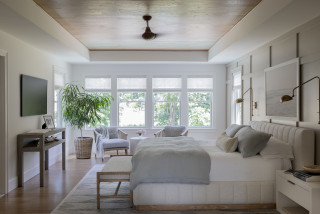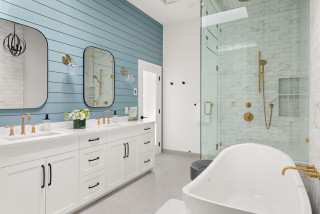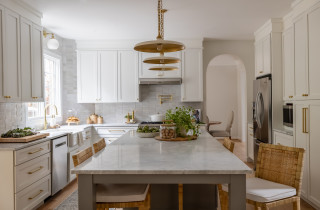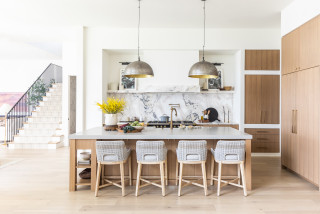
This article was originally published by a www.houzz.com . Read the Original article here. .

This article was originally published by a www.houzz.com . Read the Original article here. .

Beach-style bathrooms are light and airy, with a focus on natural materials, coast-inspired colors and a casual, easygoing mood. Beach bathrooms can lean traditional, contemporary or somewhere in between — the important thing is to keep the mood relaxed and breezy.
Key features of beach-style bathrooms:
Bold tileSpacious showerTextured elements such as pebble tile, weathered wood and mother-of-pearlWall panelingStatement wallpaperAccents in breezy coastal colors
Color palette: Beach bathrooms use colors inspired by the sand, sky and sea to create a sense of place. Crisp white paired with seaside blue is a popular palette, though it’s certainly not the only option. For a more vibrant take, look to leafy greens and bold corals inspired by the tropics.
Your Guide to a Beach-Style Bathroom
This article was originally published by a www.houzz.com . Read the Original article here. .

Mediterranean-style kitchens emphasize natural materials such as wood, brick and stone for a casually elegant, earthy look inspired by sun and sea. While traditionally Mediterranean kitchens have featured warm hues and heavy wrought iron details, today’s iterations often take a lighter approach, with plenty of white space to offset the rich tilework and natural wood.
Key features of Mediterranean-style kitchens:
Dark, rich wood, such as walnutMaterials with patina, such as brick, stone and reclaimed wood
Colorful tileCurving arch detailsLighting made from wrought iron, hammered metals and reclaimed woodNatural fiber and leather accents
Color palette: Rich hues inspired by the warm earth and sparkling sea — such as chile pepper, terra cotta and cerulean blue — look striking in a Mediterranean kitchen, especially against a calming backdrop of white and natural wood.
Your Guide to a Mediterranean-Style Kitchen
This article was originally published by a www.houzz.com . Read the Original article here. .

“As this project required us to amp up the glam, we turned the soldier tile horizontally to allow for a few more inches of the beautiful plume-styled stonework to take center stage,” she says. “Introducing a little bit of glass tile at the countertop line also helps with spills and cleanup, as they are not directly on the marble.”
This article was originally published by a www.houzz.com . Read the Original article here. .

“As this project required us to amp up the glam, we turned the soldier tile horizontally to allow for a few more inches of the beautiful plume-styled stonework to take center stage,” she says. “Introducing a little bit of glass tile at the countertop line also helps with spills and cleanup, as they are not directly on the marble.”
This article was originally published by a www.houzz.com . Read the Original article here. .
What it is: More than any other style, traditional decorating embraces a sense of history, with heirloom-quality antiques, rich woods, plush carpets and pretty patterns. Although traditional style does tend to be formal, with symmetrical arrangements and refined materials, the ultimate goal is comfort, warmth and a welcoming feel.
Where it comes from: Traditional style traces its roots to 18th- and 19th-century Europe, although a general sense of honoring the past is more central to the style than a focus on any particular region of the world.
Good to know: At first glance it may be hard to distinguish between a traditional and transitional space (and it doesn’t help that the words are so similar), but it’s easier when you know what to look for. Simply put, traditional style adheres firmly to classic designs rooted in history, while transitional style draws from both traditional and contemporary looks.
Hallmarks of traditional style:
Antiques and new pieces with a timeless feelRefined color paletteClassic comforts such as a crackling fire on the hearth and floor-to-ceiling bookshelvesLuxurious materials like marble and rich woodsIntricate architectural details
This style works well with: Rustic, coastal, Mediterranean
Get the guide to traditional style